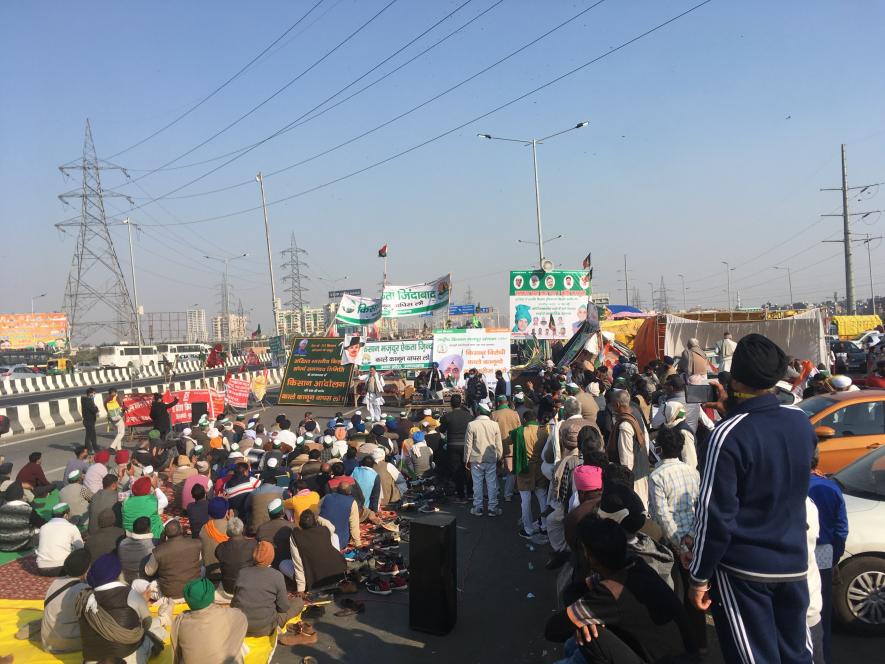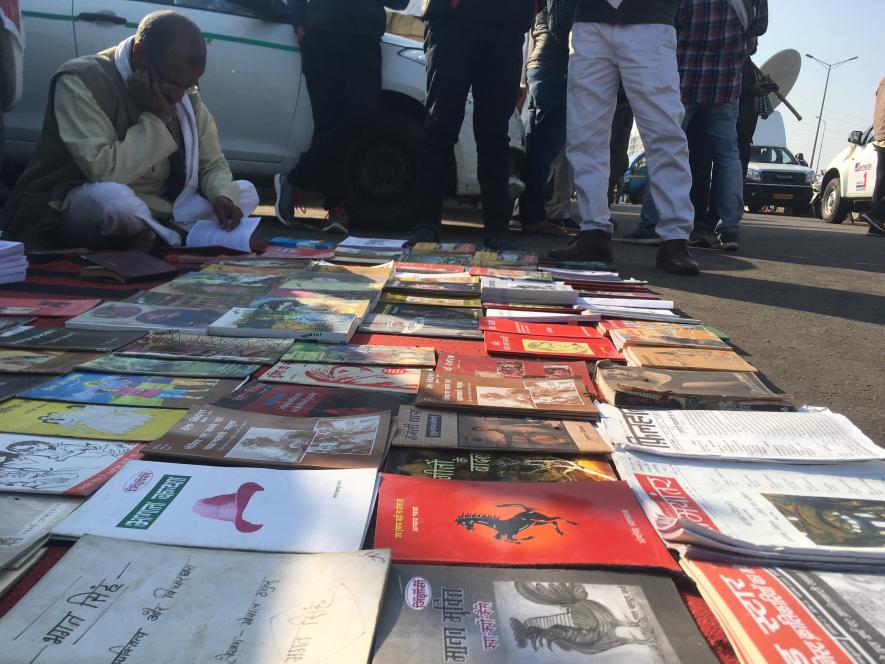At Ghazipur Border Protest, ‘Busting’ BJP’s Claims Over Farm Laws Keeps Passions High

A view of the public meeting at Ghazipur border. Image clicked by Ronak Chhabra
New Delhi: A “parade” at eleven in the morning, then public meetings till four in the afternoon, and finally some “DJ music” to dance to, courtesy the woofer-laden tractors--till ten in the night, these are just some of the daily happenings that keep the passion high at Ghazipur border where the farmers’ agitation has entered its fourth week.
As the protests near a month, one would expect monotony to kick in among the protesters. But that has not happened thanks to the above programmes, which are now routinely arranged by the volunteers present at this nodal protest site in East Delhi.
Apart from the said programmes, daily preparations behind the multiple langars that are arranged at the site, medical camps, and a library stall setup where books are available to read, also keep the farmers consumed in one way or the other. Farmers protesting at the Ghazipur border against the three farm laws recently brought by the Centre mainly hail from the Jat-dominated western region of Uttar Pradesh and Uttarakhand,
While the activities make it somewhat easier for the farmers to pass through the days, what is bringing them entertainment are the so called “enlightening claims” over the farm laws that are being made by the Bharatiya Janata Party (BJP) leaders and ministers, including Prime Minister Narendra Modi himself.
The claims are at best “funny” and at worst “nothing but lies”, according to Garendra Singh, 40, from Bijnor district. “The BJP leaders, and even the prime minister himself, are talking and giving speeches as though the protesting farmers know nothing about the reality. They think they will enlighten us with their words. But what do they actually know about our issues?” he asked.
As a result, almost every conversation, either over a hookah or otherwise, among the protesters now sees ‘busting’ of the claims that are being thrown at them.
Yesterday, said Singh, PM Modi claimed that the Minimum Support Price (MSP) would continue as usual and that it was not increased under his government, but also that more procurement of crops at MSP has taken place. Singh was referring to the remarks made by PM Modi at a Kisan Sammelan in Raisen district in Madhya Pradesh. “I must tell you the truth,” he said, continuing, “When a farmer goes to a mandi (in Uttar Pradesh) to sell his produce, although the private trader records the transaction on paper to be taking place at MSP, in reality, he pays only a fraction of the amount to the farmer,” said Singh who owns 18 acres of tilled land back in his village.
Last year, when SK Sen, 75, from Uttarakhand’s Khatima, sold his wheat, the same thing happened to him. “The message I received had lesser quantity recorded in it than what was actually procured from me,” the owner of 16 acres of land said. This meant, according to him, that even though the records showed that a said quantity was procured at MSP, he only received lesser than that -- the difference between the two amounts usually being up to Rs. 500 to 600 per quintal.
“MSP has remained, and will remain. It is a myth being spread that MSP will be discontinued,” The Hindu quoted PM Modi as saying while addressing the farmers from Madhya Pradesh on Friday.
Only a few metres ahead of Sen was Swarn Singh, 34, from UP’s Shahjahanpur. Singh explained how a few days ago, a subsidy that was announced by the Centre was “falsely projected” as an assistance to sugarcane farmers.
The Cabinet Committee on Economic Affairs on Wednesday had approved about Rs. 3,500 crore for the purpose of directly crediting this amount into farmers’ accounts on behalf of the sugar mills. Sugarcane harvesting is majorly observed in parts of western UP. The industry has been mired with complaints for many years with farmers accusing mill owners of due payments.
Singh, owning 12 acres of land in Shahjahanpur, said he hasn’t received his due of up to Rs 3.5 lakh from a private mill owner in his district since January this year. He asked how this was an “assistance” to the sugarcane farmers. “The government is only crediting the amount in farmers’ accounts that the mill owner was supposed to pay. So basically, this is an assistance that is provided to the mill owner and not the farmer. A farmer would not get anything extra,” he said, contenting the decision would, however, translate into clearing of the dues of farmers. “But why were the payments delayed in the first place?” he questioned.
Standing beside him was Bijender (who only goes by one name), 47, from Bagpat district, who had a rather similar experience to Singh because of being a sugarcane farmer. “The government till now cannot ensure timely payments to farmers even by these local mill owners. How will it protect us from the big corporate houses when we enter into a contract with them?” he lamented.
Panjab Singh, 41, who owns 12 acres of land jointly with his brother in Bijnor’s Sabdalpur village, told NewsClick that with no “proper facilities” to ensure government procurement in their local mandis, the duo usually takes their produce to Haryana to sell it at MSP. “We incur a cost of almost Rs. 150 per quintal in travelling to Haryana. But it is still more profitable as we get better prices there.”
Asked why he was not convinced with the fact that the much touted “agriculture reforms” would now allow him to sell anywhere, as being highlighted by those who vouch for the farm laws, Singh from Bijnor laughed it off. “We find it difficult even to carry our produce to the local mandi - because even that is not much near to us. Why would any farmer want to travel more to sell their produce? To be ‘able’ to sell anywhere is only possible for big corporate houses,” Singh said.
Rakesh Tikait, leader of Bharatiya Kisan Union (Tikait), told NewsClick that farmers are slowly understanding the “reality” behind the BJP’s policies.
Indeed, the stage set for public meetings at the Ghazipur border protest witness speeches not just over farm laws but issues ranging from privatisation of national assets and divisive politics, among others. The recent attempts to brand the farmers’ protest as being “hijacked” by ‘Khalistani’ elements or ‘Maoists’ have only strengthened the agitations.

A protester reading a book at the Ghazipur border protest site. Image clicked by Ronak Chhabra
Anuj Singh, head of volunteers at the protest site, said that to counter the BJP’s narrative, the unions active in the protest there have till now organised three “Mahapanchayats” that have seen crucial participation from the khap leaders and their clansman; the latter have on their part now launched a “Jan Jagran Andolan” back in the villages to mobilise farmers.
‘Tractor Rally’ on January 26
Meanwhile, with both parties – farmers unions and the Centre – sticking to their guns over the contentious farm laws, it seems the deadlock will last for long. Anuj Singh, a volunteer and also the district president of BKU-Tikait (Prayagraj), on Saturday reiterated that the farmers were prepared for a long fight and would not be demotivated even if the Centre chose to “linger on” over the matter.
“Come January 26, if the issue stands unresolved, the farmers will take out a tractor rally with the tiranga waving over it,” he said, adding, “We want to make it clear to the Centre that the farmers will not accept anything lesser than repealing of the laws.”
Get the latest reports & analysis with people's perspective on Protests, movements & deep analytical videos, discussions of the current affairs in your Telegram app. Subscribe to NewsClick's Telegram channel & get Real-Time updates on stories, as they get published on our website.
























